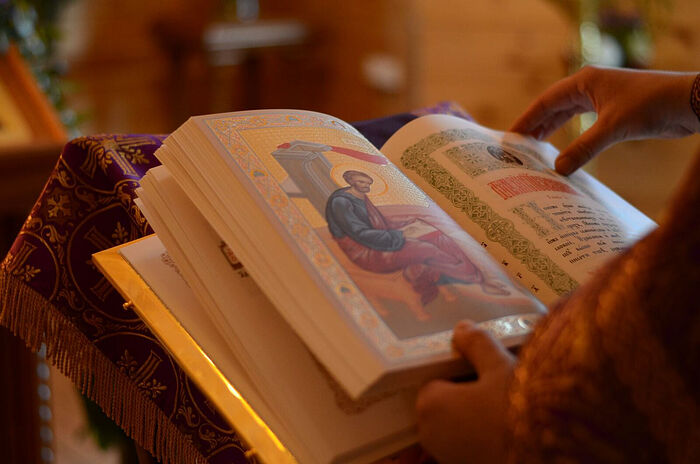In the name of the Father, the Son, and the Holy Spirit.
Dear brothers and sisters! I am very happy to see you here in this old church, which was never closed—our beloved Church of the Forty Martyrs. Today’s apostolic reading, from the epistle of the holy apostle Paul to the Colossians, is very important to every Christian. We need to attentively reread it from time to time and try it on ourselves for size.
What makes us Christians? Faith, we’ll say. No! The devils also believe, and tremble (Js. 2:19). The devils also believe in God and tremble over their horrifying lot! The Apostle James says in his epistle to all of us, But wilt thou know, O vain man, that faith without works is dead? (Js. 2:20) What are works of faith? Fulfilling Christ’s commandments—sincerely, with all your heart; when these commandments are desired by us; when we strive towards them; when we awaken, nurture, and grow feelings in ourselves that are contradictory to sin. Apostle Paul writes, Lie not one to another, seeing that ye have put off the old man with his deeds; And have put on the new man, which is renewed in knowledge after the image of him that created him (Col. 3:9–10).
Array yourself in Jesus Christ—in the God-man! We are all called to be God! Today we celebrate the memory of a great universal saint, Athansius of Alexandria. He said, “God become man so that man might become God.” We who are far from theology may have not even have heard this, and don’t understand it. God became man in Jesus Christ, so that man might become God! The Lord says that He gives each of us the Kingdom of Heaven. We have not thought about how only God can receive the Kingdom of Heaven. Man cannot receive it—only God can receive it!
God’s mercy and love for man are such that He makes us God by grace. Not in essence (we are corruptible people), but by grace; and by His special gift He makes us God. Let’s look at ourselves. Man is imperfect, infirm, weak, and prone to sin—those evil and vile qualities about which the apostle Paul writes: anger, wrath, malice, blasphemy, filthy communication (Col. 3:9:8), evil lust, greed, fornication, impurity. All of this is in our hearts. Out of His mercy God united with us, gradually transforming the human soul into a soul made in the image and likeness of the Divinity, and makes us inheritors of the Kingdom of Heaven—that is, He makes us gods unnoticeably to ourselves. We live in vanity, do not often contemplate that greatest of books, the Gospel. We don’t often read it. But all the mysteries of the present and future age are revealed in it. Our pious ancestor, in the times before internet and television, studied the Gospel and immersed themselves in it.
The apostle Paul tells us what we ought to do: Put on therefore, as the elect of God, holy and beloved, bowels of mercies, kindness, humbleness of mind, meekness, longsuffering… (Col. 3:12). How pleasant it is when people love us, when they wish us well and greet us warmly! And how hard it is when someone hates us. Put on therefore, as the elect of God, holy and beloved, bowels of mercies, kindness, humbleness of mind, meekness, longsuffering; Forbearing one another, and forgiving one another, if any man have a quarrel against any: even as Christ forgave you, so also do ye. (Col. 3:12–13). We can become famous, the best professionals of our line of work. But the Lord and the apostles talk about another greatness: Array yourself in love, which is the totality of all perfection, before the Creator of this world and our life. The Lord expects this from us. And let the peace of God rule in your hearts, to the which also ye are called in one body; and be ye thankful (Col. 3:15). Forbearing one another, and be ye thankful…1 Magnanimity and forbearance toward people should be in our hearts if we want to be Christians. Do not take seriously even the cruelest words aimed at us; be, in the image of Christ, magnanimous and forbearing to people’s infirmities. Then you will come closer to what the Lord expects of us. And let the peace of God rule in your hearts, to the which also ye are called in one body… One body—this is the Church of God; it is us, who stand here. What does And let the peace of God rule in your hearts mean? In the Greek it is expressed more precisely: “Let the peace of God be the judge in your hearts.” If we want to understand whether our thoughts are correct or not, we should ask ourselves whether they are in accordance with the peace of God. St. Seraphim of Sarov said, “Acquire the spirit of peace, and thousands will be saved around you.” Let’s put that judge in our souls—the peace of God. Being in accordance with the peace of God (in our feelings) means our thoughts are good ones. If they aren’t in accordance with the peace of God, it means they could be from the devil. Let the word of Christ dwell in you richly in all wisdom; teaching and admonishing one another in psalms and hymns and spiritual songs, singing with grace in your hearts to the Lord (Col. 3:16). Even when we are silent and quietly contemplate the peace of God, in the heart of a true Christian (as was Fr. John (Krestiankin); and he talked about this) there should be wholehearted hymning of gratitude and glory to God. St. Ephraim the Syrian said, “True prayer means giving thanks.” Parents know about this. When a child thanks them, it means he understood his parents; he recognized his father’s and mother’s love.
The Gospel is meant to be our table reference book. The Holy Church, which has entrusted us with the Sacrament of Baptism, having made us Orthodox Christians, expects that this book will not just lie on the table. St. Seraphim of Sarov said, “The human mind should swim in Holy Scripture.” The person who studies Holy Scripture, who lives in it and strives to live according to it, is invincible. No complications in life will ever touch him! A person who only superficially knows Holy Scripture, just as anyone who does anything superficially, will never attain to anything. The Gospel is the book of our life. The Lord expects Orthodox Christians to sincerely experience courageous, invincible, and beautiful love—which, as it says in the epistle of the apostle Paul to the Colossians, is the bond of perfectness (Col. 3:14).




